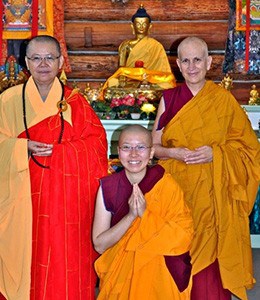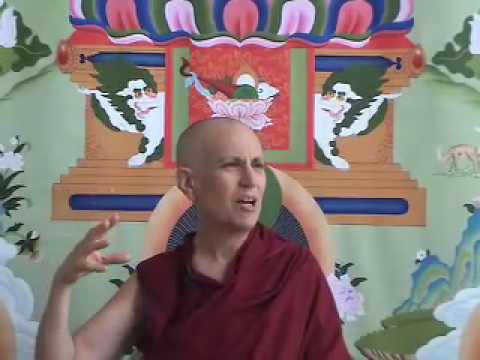Death is definite
Stages of the Path #24: Death & Impermanence
Part of a series of Bodhisattva's Breakfast Corner talks on the Stages of the Path (or lamrim) as described in the Guru Puja text by Panchen Lama I Lobsang Chokyi Gyaltsen.
- How the nine-point death meditation is helpful
- The importance of thinking about death
- Setting priorites in our lives
We’ve been talking about impermanence and death. The nine-point death meditation is very helpful to do in this case to really familiarize ourselves with the idea that we’re going to die, that we don’t know when, and to know what’s important at the time of death, and thus to use that to set our priorities in our lives.
Some people really avoid talking about death. They think if we talk about it then it’s going to happen, implying that if we don’t talk about it then it won’t happen. [laughter] That’s not very logical, is it? Some people are so uncomfortable talking about death. I was actually quite relieved when I encountered Buddhist teachers where death is talked about, there it is. There’s no shame, there’s no anger, there’s no this or that, it’s just this is a reality so let’s talk about it so that we can learn how to work with it.
In the nine-point death meditation there are nine points, and they’re divided into three sections. The first section is talking about how our death is definite. The first point under that is that everybody dies, no matter who they are. We can certainly look at this. Even the great religious leaders, the great political leaders, the great geniuses on the planet, everybody is mortal and everybody dies. It’s just the way it is. That’s a reality. Death is definite.
The second point is that there’s nowhere in this universe where we can go to avoid it. We might think if we could just go somewhere else where they have better healthcare, where people are nicer, where the weather is nicer, where this, where that, then somehow I’m not going to die. But there’s nowhere we can go. Death is part of the fact of…. Because the moment you’re born…. We’re born due to causes and conditions. So from the moment, actually, of conception we’re in the process of aging. Due to causes and conditions, the whole thing is under the influence of causes and conditions, principally ignorance and karma, and then, of course, the conditions of the elements of our body, and these things are changing in a very natural process. When the causal energy runs out then the result is that the organism dies. No place to go to avoid it.
We can keep ourselves busy in our lives doing many other things in order to pretend that death isn’t definite, but that doesn’t make death indefinite. What happens instead is that our whole life goes by without our having done any practice, just having been caught in distraction because we have this mind that says well, death won’t happen until after I practice. So if i don’t practice then I’ll just live forever. No, doesn’t work that way.
These points are very important to think about and to really familiarize our minds with the fact that we, personally, are going to cease being the ego identity we are right now, and that the people that we care about in our lives and that we rely upon are also going to die. I think that if you think about it in the right way, just as it being a fact of the situation we’re in, familiarizing ourselves with “I’m going to die, my parents are going to die, my loved ones are going to die, my teachers, my friends, all these people are going to die…” Of course, we don’t know when, but we know it’s going to happen. Then when it does happen we’ve already familiarized ourselves with that idea so it helps us to just take it more in stride and not be so freaked out.
You see many people, “Well, how can this happen? You were supposed to live forever. Death was not supposed to happen.” And then they’re completely freaked out. But when we understand that we and our loved ones are going to die, then we begin to mentally make some kind of preparation in our own hearts for accepting that situation. That also helps us a great deal to appreciate the time we do have with them. And when we appreciate the time then we don’t spend the time fighting with them or quarreling with them, or these kinds of things that we so often do when we take people for granted.
Venerable Thubten Chodron
Venerable Chodron emphasizes the practical application of Buddha’s teachings in our daily lives and is especially skilled at explaining them in ways easily understood and practiced by Westerners. She is well known for her warm, humorous, and lucid teachings. She was ordained as a Buddhist nun in 1977 by Kyabje Ling Rinpoche in Dharamsala, India, and in 1986 she received bhikshuni (full) ordination in Taiwan. Read her full bio.


